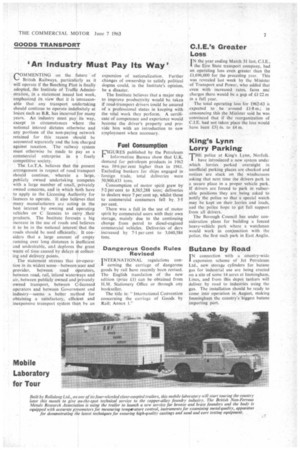'An Industry Must Pay Its Way' C OMMENTING on the future
Page 9

If you've noticed an error in this article please click here to report it so we can fix it.
of British Railways, particularly as it will operate if the Beeching Plan is finally adopted, the Institute of Traffic Administration, in a statement issued last week, emphasized its view that it is unreasonable that any transport undertaking should continue to operate indefinitely at losses Such as B.R. has incurred for many years. An industry must pay its way, except in circumstances where the national interest dictates otherwise and any portions of the non-paying network retained for this reason should be accounted separately and the loss charged against taxation. The railway system must otherwise be made to pay as a commercial enterprise in a freely competitive society. The Lo.T.A. believes that the present arrangement in respect of road transport should continue, wherein a large, publicly owned undertaking competes with a large number of small, privately owned concerns, and in which both have to apply to the Licensing Authority for licences to operate. It also believes that many manufacturers ale acting in the best interest by owning and operating vehicles on C licenees to carry their products. The institute foresees a big increase in the use of roads and believes it to be in the national interest that the roads should be used efficiently. It considers that a large amount of empty running over long distances is inefficient and undesirable, and deplores the great waste of time caused by delays at collecting and delivery points. The statement stresses that co-operation in its widest sense--between user and provider, between road operators, between road, rail, inland waterways and air, between publicly owned and privately owned transport, between C-licensed operators and between Government and industry—seems a better method for obtaining a satisfactory, efficient and inexpensive transport system than by an expansion of nationalization. Further changes of ownership to satisfy political dogma -could, in the Institute's opinion, be a disaster. The Institute believes that a major step to improve productivity would be taken if road-transport drivers could be assured Of a professional status in keeping with the vital work they perform. A certificate of competence and experience would become the driver's property and vide him with an introduction to employment when necessary.
pronew




































































































